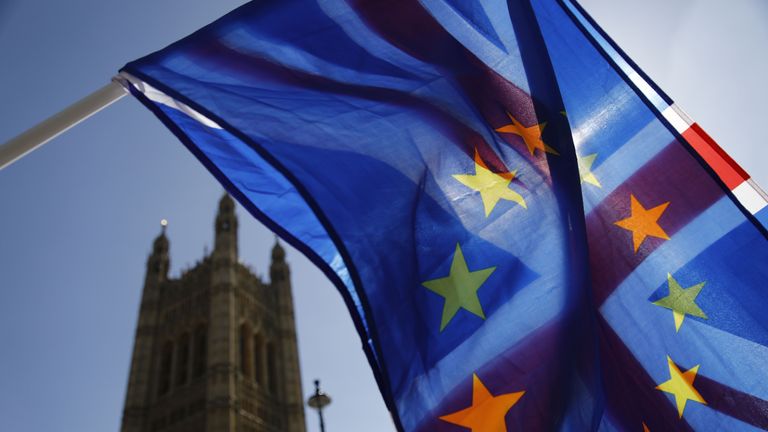Brexit group chairman 'deeply concerned' over state of negotiations
German MEP David McAllister has told Sky News trust and confidence in the UK government has been "damaged" by recent disputes.
Friday 18 September 2020 20:54, UK
One of the key figures in Brexit talks has told Sky News that he is "deeply concerned" over the state of negotiations.
German MEP David McAllister also says that trust and confidence in the British government has been "damaged" by recent disputes, and says a trade deal cannot be agreed unless the British government withdraws its controversial Internal Market Bill.
Mr McAllister, the chairman of the UK Co-ordination group in the European Parliament, which scrutinises Brexit negotiations, also told me that the bill was an "unacceptable threat" to the Brexit Withdrawal Agreement.
"This bill came out of the blue and, across party lines in the European Parliament, we are deeply concerned," he said.
"Not just about the lack of progress in negotiations, but also about this bill. It clearly breaches the withdrawal agreement, including on the very sensitive protocol on Ireland and Northern Ireland.
"We will not ratify a future deal with the United Kingdom if there is a threat to the Withdrawal Agreement. This has to be withdrawn."
When asked if he was mollified by the Neil amendment, which would require the House of Commons to hold a vote before allowing the government to override the existing Brexit agreement, Mr McAllister shook his head.
He said: "We want an agreement, but a crucial pillar of our future relationship is that the Withdrawal Agreement has to be implemented fully by both sides.
"The Withdrawal Agreement was ratified by the House of Commons, the member states and the European Parliament. You can't unilaterally change it. This isn't how international politics works.
"Unfortunately trust and confidence have been damaged. This isn't helpful at this crucial stage of negotiations."
Mr McAllister, whose father is Scottish, said that he was still "confident" that a deal could be struck, but said that the EU was now making significant preparations ahead of a possible "no deal" outcome.
"Nobody should underestimate the social and economic consequences of no deal and I still think it would be much, much better for both sides to have a deal," he continued.
"We want to get this done now, but trust and confidence have to be restored. The ball is in the British court - nowhere else.
"We need an agreement by the end of October, but if the UK continues to breach, or threaten to breach, the Withdrawal Agreement then we will not ratify a trade deal.
"We have negotiated in good faith and we continue to negotiate in good faith. If you look at the events of the past week, it's pretty obvious where the trust and confidence have been breached."
:: Subscribe to the All Out Politics podcast on , , ,
The government has argued that its bill is designed to "protect jobs and trade", but senior figures within the Cabinet have disagreed over whether or not the bill would break international law.
Two days of informal Brexit talks have taken place this week in Brussels and negotiations will resume next week in London.
Both sides have said that any deal would have to be reached before the end of next month in order to be fully ratified by the end of the year, when the Brexit transition period comes to an end on 31 December.






